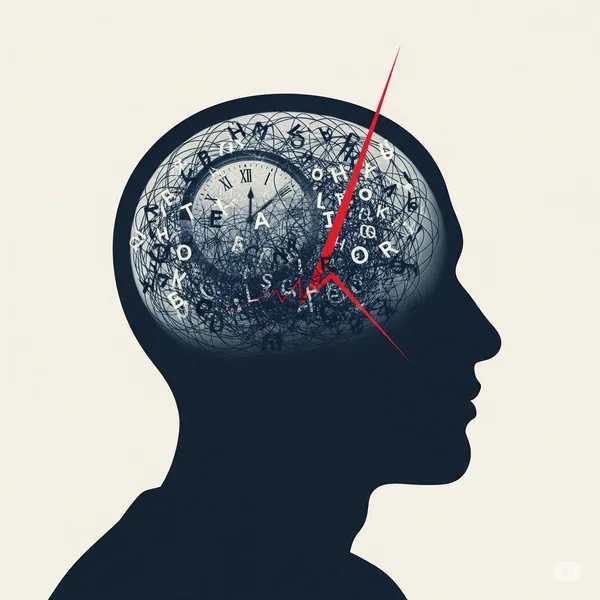De la Panique au Succès : Mon Histoire pour Surmonter l'Anxiété aux Examens
July 6, 2025 | By Isla Caldwell
L'horloge murale ne faisait pas que tic-taquer ; elle martelait. Chaque seconde faisait écho au battement frénétique de mon propre cœur. La copie d'examen était posée face cachée sur mon bureau, tel un drapeau blanc que j'avais déjà envie de brandir en signe de reddition. Mes paumes étaient moites de sueur, ma vision se rétrécissait, et les faits et formules méticuleusement mémorisés s'évaporaient dans un brouillard de panique pure. Si vous avez déjà ressenti cela, vous vous êtes probablement demandé : qu'est-ce que l'anxiété aux examens ? et vous vous êtes senti totalement seul dans votre combat. Je suis là pour vous dire que vous ne l'êtes pas. Voici mon histoire de résistance, et cela peut être votre guide, vous aussi. Tout commence par la compréhension de votre propre esprit, et une excellente première étape peut être de passer un test d'anxiété confidentiel et perspicace.

Premièrement, Comprendre Ce Qu'est Vraiment l'Anxiété aux Examens
Avant de pouvoir la combattre, il faut la nommer. Pendant longtemps, je pensais simplement que j'étais "mauvais aux examens" ou que je "ressentais de la nervosité". Mais c'est bien plus que cela. L'anxiété aux examens est un type d'anxiété de performance où la pression des examens intense entraîne des réactions physiques et émotionnelles invalidantes.
C'est Plus Que de la Simple "Nervosité"
La nervosité est la façon dont votre corps dit : "C'est important." L'anxiété aux examens est votre corps qui hurle : "DANGER !" C'est la différence entre avoir des papillons dans le ventre et avoir un nid de guêpes. Les sentiments anxieux sont si accablants qu'ils interfèrent avec votre capacité à performer.
Les Symptômes Physiques et Mentaux que j'ai Expérimentés
Peut-être que certains de ceux-ci vous disent quelque chose. Pour moi, les symptômes physiques et mentaux formaient une équipe redoutable. Mon cœur s'emballait, j'avais la nausée et mes mains tremblaient. Mentalement, mon esprit se vidait complètement, ou pire, il se remplissait d'un monologue intérieur d'échec : "Tu vas échouer", "Tu n'as pas assez étudié", "Tous les autres savent ça." C'était épuisant et autodestructeur.
Ma Stratégie : 5 Stratégies Actionnables Contre l'Anxiété aux Examens Qui Ont Fonctionné
Voici les stratégies exactes contre l'anxiété aux examens que j'ai utilisées pour renverser la situation. Ce ne sont pas des baguettes magiques, mais ce sont des outils puissants qui m'ont redonné un sentiment de contrôle.

Stratégie 1 : La Technique du "Brain Dump" Pré-Examen
Dès que j'ai eu l'autorisation de commencer, je retournais une feuille de brouillon et passais 60 secondes à écrire frénétiquement toutes les formules, dates clés et concepts que j'avais peur d'oublier. Le sortir de ma tête et le mettre sur papier libérait de l'espace mental et servait de filet de sécurité.
Stratégie 2 : Maîtriser la Méthode de Respiration 4-7-8
Cela a tout révolutionné. C'est une méthode de respiration simple que vous pouvez faire n'importe où.
- Inspirez silencieusement par le nez pendant 4 secondes.
- Retenez votre souffle pendant 7 secondes.
- Expirez complètement par la bouche, en produisant un son de "souffle", pendant 8 secondes. Répétez 3 à 4 fois. Cela calme physiologiquement votre système nerveux.
Stratégie 3 : Changer Mon État d'Esprit avec le Recadrage Cognitif
Cela peut sembler complexe, mais il s'agit de remettre en question vos pensées négatives. C'est un élément essentiel pour apprendre à gérer l'anxiété aux examens.
- Au lieu de penser : "Je vais échouer à cet examen."
- Essayez de penser : "Je me suis préparé pour cela. Je ferai de mon mieux sur les questions que je connais."
Cette pratique de
recadrage cognitifn'ignore pas la peur, mais elle l'empêche d'être la seule voix dans votre tête.
Stratégie 4 : Un Programme d'Étude Qui Préviene la Panique de Dernière Minute
Un bon programme d'étude est une attaque proactive contre l'anxiété. J'ai arrêté de bachoter. Au lieu de cela, j'ai utilisé la répétition espacée – étudier par courtes sessions sur une période plus longue. Savoir que j'avais révisé régulièrement pendant des semaines, et pas seulement la veille, a considérablement réduit mes niveaux de panique.
Stratégie 5 : Créer un Rituel Apaisant Avant l'Examen
Nous sommes des êtres d'habitudes. J'ai créé un simple rituel apaisant pour l'heure précédant chaque examen. Cela impliquait d'écouter une playlist relaxante spécifique, de boire une tasse de thé à la camomille et d'éviter les révisions de dernière minute effrénées. Cela signalait à mon cerveau qu'il était temps de me concentrer, et non de paniquer.
Comment Gérer l'Anxiété Pendant l'Examen Même
Alors, que se passe-t-il lorsque l'anxiété frappe en plein examen ? Que faire quand votre esprit se vide ? Ne paniquez pas. Vous avez des outils pour ce moment aussi.
Techniques d'Ancrage Que Vous Pouvez Utiliser à Votre Bureau
Utilisez la méthode 5-4-3-2-1. Nommez silencieusement, pour vous-même :
- 5 choses que vous pouvez voir.
- 4 choses que vous pouvez sentir (votre chaise, le bureau, vos pieds sur le sol).
- 3 choses que vous pouvez entendre.
- 2 choses que vous pouvez sentir (une odeur).
- 1 chose que vous pouvez goûter.
Cet exercice simple sort votre esprit de la spirale d'anxiété et le ramène dans le moment présent. Ces
techniques d'ancragesont incroyablement efficaces.
Que Faire Quand Votre Esprit se Vide
D'abord, respirez. Utilisez la méthode 4-7-8. Ensuite, ne fixez pas la question qui vous bloque. Passez à autre chose. Trouvez une question à laquelle vous savez répondre. Bâtir un peu d'élan peut souvent débloquer l'information qui était temporairement inaccessible.
À Votre Tour de Passer de la Panique au Succès
Mon histoire d'anxiété aux examens n'est pas unique, c'est pourquoi je la partage. Surmonter l'anxiété aux examens est un voyage pour découvrir ce qui fonctionne pour vous. Vous êtes plus puissant que votre panique.
C'est un Voyage, Pas une Course
Soyez patient avec vous-même. Chaque petite victoire – chaque fois que vous utilisez un exercice de respiration ou que vous recadrez une pensée négative – est un pas dans la bonne direction. Vous apprenez une nouvelle compétence.
Faites le Premier Pas : Comprenez Mieux Votre Anxiété
Bien que ces stratégies soient puissantes pour le stress lié aux examens, l'anxiété peut parfois être plus généralisée. Si vous avez l'impression que l'anxiété affecte d'autres aspects de votre vie, passez notre test d'anxiété gratuit et confidentiel de 5 minutes pour obtenir une image plus claire. Comprendre est la première étape.
Quel est Votre Meilleur Conseil Contre l'Anxiété aux Examens ? Partagez-le dans les Commentaires !
Nous pouvons tellement apprendre les uns des autres. Quelle stratégie vous a le plus aidé ? Partagez-la ci-dessous !
Vos Meilleures Questions sur la Surmontée de l'Anxiété aux Examens

Comment puis-je calmer mon anxiété 5 minutes avant un examen ?
Concentrez-vous sur votre respiration. La méthode de respiration 4-7-8 mentionnée ci-dessus est parfaite pour cela. Trouvez un coin tranquille, fermez les yeux et faites 3-4 cycles. Cela envoie un signal direct au centre nerveux de la panique de votre cerveau pour qu'il se calme. Adoptez également rapidement une « power pose » dans une cabine de toilettes – cela peut paraître anodin, mais des études montrent que cela peut renforcer la confiance en soi.
L'anxiété aux examens est-elle une véritable condition de santé mentale ?
Oui, absolument. Selon l'Anxiety & Depression Association of America (ADAA), c'est une forme d'anxiété de performance et elle est reconnue par les professionnels de la santé mentale. Bien que beaucoup de personnes éprouvent des symptômes d'anxiété aux examens légers, pour d'autres, elle peut être suffisamment sévère pour avoir un impact significatif sur leurs objectifs académiques et professionnels. Si vous vous sentez débordé par l'anxiété, votre ressenti est légitime. Vous pouvez avoir une meilleure idée de vos niveaux d'anxiété généraux en passant notre test d'anxiété basé sur le GAD-7.
Ces stratégies peuvent-elles aider avec d'autres types d'anxiété ?
Absolument. Les techniques comme la respiration profonde, le recadrage cognitif et l'ancrage sont des compétences fondamentales pour gérer de nombreux types d'anxiété, de l'anxiété sociale à l'anxiété généralisée. La clé est de les appliquer aux situations spécifiques qui vous déclenchent. Pour comprendre si votre anxiété est plus généralisée, passer un test d'anxiété général peut fournir des informations précieuses.